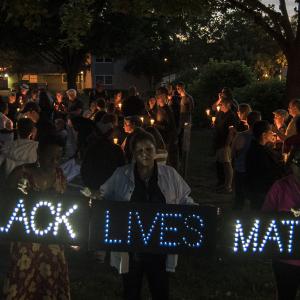Named one of 15 Faith Leaders to Watch in 2015 by the Center for American Progress, Rev. Jennifer Bailey is an ordained minister, community organizer, and emerging Millennial leader in multi-faith movement for justice. She is a Founder of the Faith Matters Network a new interfaith community equipping leaders in the American South with tools to challenge economic injustice in local communities through story and action. Rev. Jen is currently a Nathan Cummings Foundation Fellow, an elite cohort of innovative leaders combatting issues of economic and social inequality with outside-the-box thinking. She is an ordained itinerant elder in the African Methodist Episcopal (A.M.E.) Church.
Posts By This Author
The Political Nature of Black Women’s Trauma
For black women, our trauma is by nature political. Our very embodiment places us in a never-ending cycle of entanglement with systems, people, and policies designed to perpetuate violence and domination.
God's Love In the Time of Bathroom Bills

Image via Cbenjasuwan/Shutterstock.com
His question about God’s love for him caught me by surprise. We never talked about religion. I was, admittedly, the “churchy” one in my group of friends — president of the Junior Usher Board and active in my church youth ministry. Yet even at the age of 17, devoid of theological training, I understood the core inquiry at the root of the question: Could this Christian God that I proclaimed loved us all so much accept Aaron even when so many of this God’s “followers” did not?
Weekly Wrap 11.20.15: The Ten Best Stories You Missed This Week
When unspeakable tragedies happen, our thoughts often turn to seeking justice for those harmed. What has become clear over the past week is that the definition of justice is not always universal. This week, I found myself reading a lot about how different communities relate to the concept of justice in the midst of trauma and systemic oppression.
Here are 10 pieces that got the wheels in my mind turning. I’m hopeful they will do the same for you!
Requiem for Mike Brown

Image via Dima Sobko/Shutterstock
Over the past year, #blacklivesmatter has taught me that the work of theology is not limited to the hallowed halls of academic institutions or sermonic reflections from prestigious pulpits on Sunday mornings. At community meetings and rallies, I learned new hymns in the form of movement chants. I learned that protest can be a form of prayer. #Blacklivesmatter is more than a hashtag. It is a call for repentance. It is an invitation into a state of prophetic grief and collective lament that does not anesthetize us from our pain but allows us to reconnect to the depths of our humanity by feeling, together, the torment our silence on issues of racial injustice has sown. It is only together that we will be able to actualize the transformation God is calling us to effect in this world.
When God Can Breathe, We’ll All Have Air
The past 12 months of violence against unarmed black bodies continues to draw national attention to the ongoing challenge of police brutality in the United States. Under the collective action call of #blacklivesmatter, activists and concerned citizens across the country challenge the ideology of white supremacy undergirding our criminal justice system and demand an end to state violence against black bodies. Yet the #blacklivesmatter movement is about more than an end to police brutality; it is call for the health, wholeness, and vitality of all black communities and a world in which black lives are no longer systemically and intentional targeted for demise. This includes an account of the physical environment in which black communities reside.
Refusing to Be Comforted

Madison Candlelight Vigil for Victims of Charleston Church Shooting, photo by Light Brigading / Flickr.com
I invite my Christian brothers and sisters of all racial backgrounds to join me in my prophetic grieving. Our cries cannot and should not be the same. For some of us, who inhabit black skin, our tears will be coated in rage and exhaustion. They will be punctuated by the stark feeling that we are permanently displaced in the only place we have known as home. We know that we fighting for our lives and have no choice but to cry out to God.
For others, particularly white Christians, the choice may not be as clear. Lament for Charleston cannot be separated from a challenge to the system of white supremacy that serves to protect white people and white interests. Prophetic grief requires a confession that the system of white supremacy infiltrates and shapes our worship spaces, theologies, and ethics. I have no doubt that this process will be risky for my white colleagues. Rarely does transformation occur without birthing pains. The reality of power is that while my survival is at stake, my white Christian brothers and sisters have the option to opt-out, avoid the pain, and remain silent.

